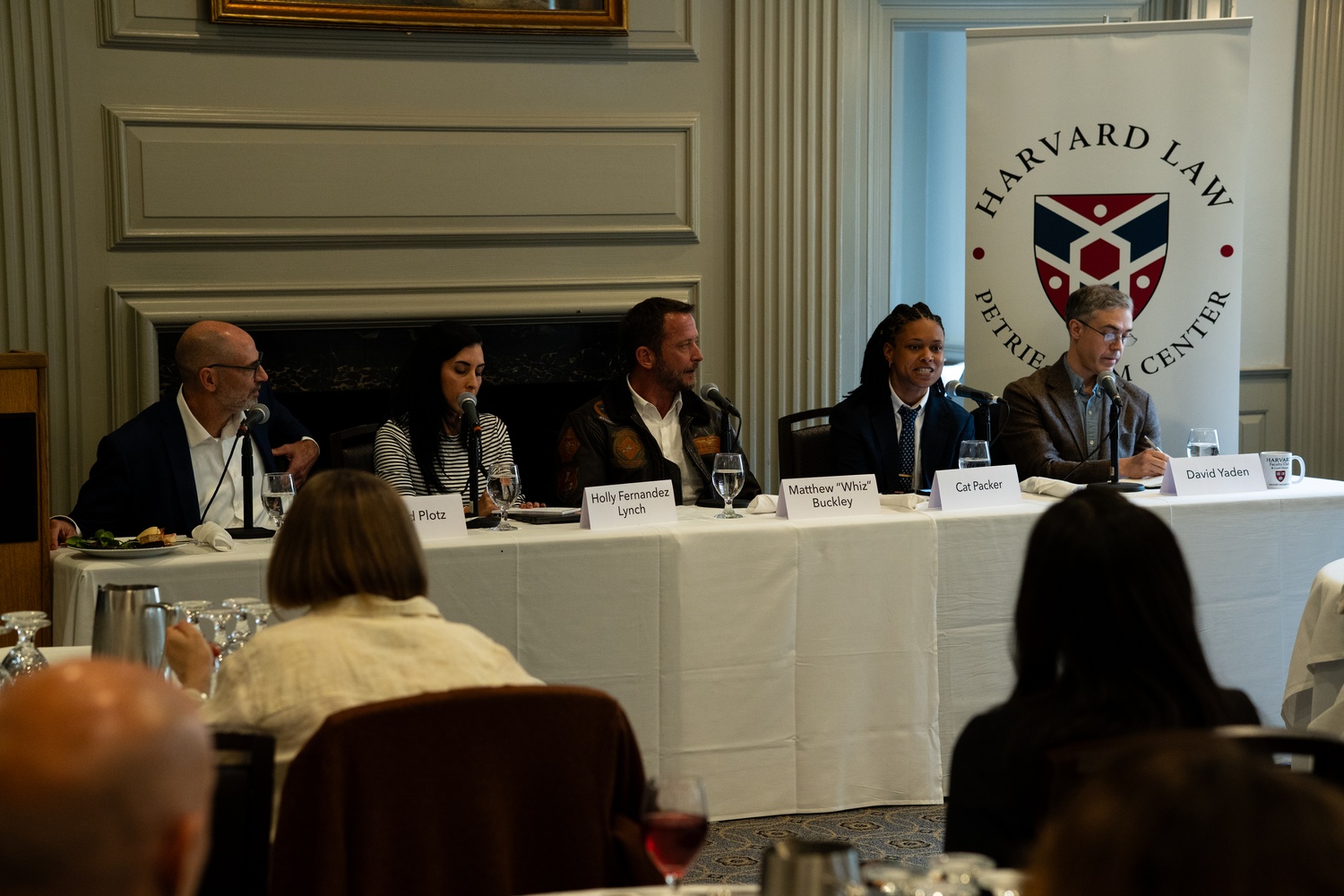
News
Summers Will Not Finish Semester of Teaching as Harvard Investigates Epstein Ties

News
Harvard College Students Report Favoring Divestment from Israel in HUA Survey

News
‘He Should Resign’: Harvard Undergrads Take Hard Line Against Summers Over Epstein Scandal

News
Harvard To Launch New Investigation Into Epstein’s Ties to Summers, Other University Affiliates

News
Harvard Students To Vote on Divestment From Israel in Inaugural HUA Election Survey
Experts Debate Federal Legalization of Psychedelic Therapy at Harvard Law School Event

Experts on psychedelic use and drug regulation discussed whether psychedelic therapy should be legalized federally at a Wednesday event hosted by the Petrie-Flom Center for Health Law Policy, Biotechnology, and Bioethics at Harvard Law School.
During the event, moderated by former editor-in-chief of Slate Magazine David Plotz, the panelists weighed the benefits of using psychedelics for treating trauma and mood disorders and considered the need for oversight by the U.S. Food and Drug Administration.
David B. Yaden, a professor of psychedelic research at Johns Hopkins University, began the panel by explaining how classic psychedelics — psilocybin, LSD, and DMT — have shown increasing progress in treating mood and substance use disorders.
Psilocybin, the active compound in magic mushrooms, is now in phase three out of four in its clinical trials.
However, most psychedelic compounds remain illegal and unapproved by the FDA.
Matthew “Whiz” Buckley, a former Navy TOPGUN fighter pilot, said psychedelics helped him heal from past traumatic events during his childhood and suicidal thoughts following his career in the military.
“I sat with Ibogaine, and it was the most spiritual experience of my life,” Buckley said. “I reconnected with my sister, my dad, and my God.”
Following his recovery with psychedelic therapy, Buckley founded the No Fallen Heroes Foundation, a nonprofit organization that provides psychedelic therapy to veterans with the goal of reducing veteran suicide rates.
Veterans face a 58 percent higher risk of suicide than non-veterans, averaging 17.6 deaths per day as of 2022.
Buckley argued that legalization of psychedelics should be expedited to lower veteran suicide rates. His nonprofit has helped “over 50 heroes heal their trauma” through psychedelic therapy, according to the organization’s website.
“We are going way too slow, as veterans are dying,” Buckley said.
Yaden cautioned against fast legalization without further research to understand the full effects of psychedelics, citing the wide range of responses individuals can have to the drug.
“Some people have transformative experiences, and that’s scientifically absolutely fascinating. Some people do, though, get worse,” Yaden said.
Holly Fernandez Lynch, a professor of medical ethics at the University of Pennsylvania, said that psychedelic medicine should be held to the same FDA standard as all other medicine.
“What’s most important for people who believe that they are going to get a medical benefit is that we have evidence to show them,” Lynch said. “That’s what the FDA model is designed to produce — evidence that the product is safe and effective.”
Cat Packer, director of drug markets and legal regulation at the Drug Policy Alliance, argued that drug policy reform must center on equity — noting that previous campaigns cracking down on drug usage, such as the ‘War on Drugs,’ have disproportionately harmed people of color.
She added that all groups should be able to access psychedelic therapies without facing discrimination.
“In many ways, the drug policies themselves can be just as harmful as the drugs can be, and there are risks that we have an opportunity to mitigate,” she said.
The biggest barrier to progress in psychedelic drug development, according to Yaden, is funding. Yaden said that most studies depend on small philanthropic grants, while large-scale, government-funded trials remain rare.
“We really need government funding, or other large, very large sources of funding, to do these pivotal, large trials that will allow us to really understand this issue,” he said.
Yaden also added that, no matter the policy outcome, it was important to continue advancing psychedelic drug research.
“I think it’s really important that regardless of how these policy frameworks play out, we need to continue to do the research to understand more about nature and ourselves,” he said.
Want to keep up with breaking news? Subscribe to our email newsletter.
